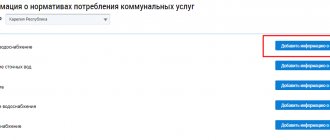The question of whether the management company is the executor of public services in the absence of a written agreement with the RSO does not lose its relevance. If previously the answer was unequivocal (yes, it is), then with the entry into force of the Rules for the Provision of Utilities on September 1, 2012, it became possible to think about options. Judicial practice currently being formed is not uniform. Along with numerous examples of the fact that the manager of an apartment building by default acts as the executor of utility services, one can find decisions that without a resource supply agreement, the RSO has direct legal relations with the owners of the premises.
Clause 14 of the Rules for the provision of utility services states that the management company begins to provide utility services no earlier than the start date of supply of the utility resource under the agreement for its purchase concluded between the management company and the RSO. That is, utilities are not provided without concluding an appropriate resource supply agreement. This rule was checked for legality, and the applicant was refused to recognize it as invalid (Decision of the Supreme Court of the Russian Federation of January 13, 2014 No. AKPI13-1116).
Later, Review of judicial practice of the Supreme Court of the Russian Federation 1 (2014)[1] was published, in which question 9 from the explanations of the judicial panel on economic disputes was formulated as follows: can a management company be recognized as a provider of utility services in the absence of an agreement concluded with RSO on the acquisition of a utility resource? However, the review did not contain the answer expected by many (“without an agreement concluded with RSO, the management company is not a contractor”). It only indicated the possibility of recognizing a management company as a provider of utility services even without a signed resource supply agreement: if the management company began managing an apartment building, issues bills for utilities to consumers and receives bills for utility resources from the RSO, this means that between the management company and RSO actually had a contractual relationship. This is an important conclusion for the further development of judicial practice, since, based on the Rules for concluding resource supply agreements[2], the corresponding contract must be concluded in writing (clause 15).
It is appropriate to recall here, especially since the arbitrators use these links, two recommendations from YOU:
- the absence of contractual relations with an organization whose energy receiving installations are connected to the networks of the energy supplying organization does not relieve the consumer from the obligation to reimburse the cost of the energy actually supplied to him (clause 3 of the Information Letter of the Presidium of the Supreme Arbitration Court of the Russian Federation dated February 17, 1998 No. 30 “Review of the practice of resolving disputes related to the contract energy supply");
- the consumer's actual use of the services of the obligated party should be considered in accordance with clause 3 of Art. 438 of the Civil Code of the Russian Federation as the subscriber’s acceptance of an offer proposed by the party providing services (performing work). Therefore, these relations must be recognized as contractual (clause 2 of the Information Letter of the Presidium of the Supreme Arbitration Court of the Russian Federation dated 05.05.1997 No. 14).
Currently, there are two categories of disputes based on an analysis of the situation that interests us: about the legality of presenting payment documents to consumers and the collection of the cost of a utility resource supplied to the house.
Position of the Supreme Court
In the summer of 2015, the Supreme Court considered two cases, the reason for which was the claims of prosecutors from two different regions, filed in the interests of an indefinite number of persons, for a ban on charging and collecting electricity fees from residents of apartment complexes for one-room distribution network. In one case, the prosecutor brought claims against the RSO (see Determination of the RF Armed Forces dated June 23, 2015 No. 8-KGPR15-2), in the other - against the management organization[3] (see Determination of the RF Armed Forces dated July 14, 2015 No. 35-KG15-1) . There is an opposite interpretation by the supervisory authority of the norms of the law about who has the right to charge consumers for utility services at ODN in the absence of a resource supply agreement concluded between the management company and the RSO.
The first case ended with the Supreme Court taking the side of the prosecutor: RSO does not have the right to charge electricity charges to ODN. The judges did not agree with the conclusions of the lower court judges (see Resolution of the Presidium of the Yaroslavl Regional Court dated 10/08/2014 in case No. 44-g-51/14) that in the absence of an agreement between the management company and the RSO, the latter is obliged to supply electricity to the house and perform the functions of a utility service provider. The Supreme Court concluded: the procedure for paying for utilities in an apartment building depends on the chosen method of management, and the right to charge and collect fees for the provided utilities belongs to the person, including RSO, on the basis of a decision made in the manner prescribed by law by the general meeting of owners of premises in the apartment building to make utility fees for a specific regional distribution system. At the same time, it was emphasized: housing legislation does not allow the possibility of direct payment by owners and tenants of premises in apartment buildings to resource supplying organizations for utilities consumed when using common property in apartment buildings (Part 7.1 of Article 155 of the Housing Code of the Russian Federation), with the exception of the case where the owners of premises in the house directly Management of MKD (Part 8 of Article 155 of the Housing Code of the Russian Federation). Current legislation does not grant resource supplying organizations the right to collect payment from consumers for utilities consumed for general house needs; therefore, such organizations do not have the right to make calculations and demand directly from residents of apartment buildings served by management companies payment for utility resources spent for common house needs, as well as compensation for losses, since they are not contractors and do not manage apartment buildings, and therefore are not responsible for the quality of utilities and services for the maintenance of common building engineering networks.
Indeed, in Part 7.1 of Art. 155 of the Housing Code of the Russian Federation, as amended, was in force until June 30, 2015, it was clearly stated that, by decision of the general meeting, residents can pay directly to the RSO only for utilities consumed on the premises. It turns out that the payment for utilities to the ODN should in any case be received by the management company if it acts as a provider of utilities. Therefore, the question of the legality of billing for utility services on ODN is directly related to the status of the provider of utility services. Please note that here the Supreme Court of the Russian Federation did not delve into the discussion of the issue of the presence or absence of actual contractual relations between the Criminal Code and the RSO. The court operated only with the provisions of the Housing Code, from which it clearly follows that if the management company manages the house, it receives payment for utilities on the one-room apartment building.
The Supreme Court sent the second case for reconsideration to the court of first instance with a recommendation to take into account specific circumstances that may indicate actual contractual relations between the management company and the RSO in the absence of a concluded resource supply agreement, which would indicate that the status of the provider of public services belongs to the management organization, and not RSO (it is documented that during the disputed period the management company paid for consumed electricity to RSO).
We know that the conclusions made in the ruling of the RF Supreme Court, adopted following the consideration of a particular case, are not binding on lower courts, however, in practice, judges usually rely on the conclusions made by the RF Supreme Court.
Causes
Let us begin our consideration of this topic with a more or less “valid” reason why the HOA’s debts may accumulate to resource supply companies, and as a result, a case for declaring the HOA’s bankruptcy may be initiated.
The reason for this is irresponsible residents of the house who do not make payments on utility bills on time.
In any building there will always be such apartments and “dysfunctional” residents who accumulate debts on utility bills.
Due to the accumulation of debts, certain penalties are imposed and a penalty is charged. And there is simply nothing to pay off the debts and fines of the HOA, since the organization is a non-profit, and therefore does not have its own income to cover the debts. In this case, the law does not provide for the protection of the interests of bona fide tenants.
Companies supplying utility services are also not interested in the details of the origin and growth of debt. There is no procedure for communication and clarification of relations between service providers and consumers, and the former are not particularly needed.
A utility provider has a contract under which it provides services and receives payment for them. In case of failure to comply with the conditions, the supplier has the right to turn off the supply of certain resources, or use other methods within the framework of the law.
In any case, conscientious payers may also suffer, but there are no ways to legally clarify relations with residents through whose fault the debt has accumulated, and certainly these nuances are not of interest to the companies that supply utilities to homes.
The next option is even more unpleasant than the previous one.
There are cases where the bankruptcy of an HOA occurred as a result of misappropriation of funds contributed by residents.
Regularly transferring money to the HOA, the residents were calm for the time being, but at one point the hour of reckoning came, when it turned out that the HOA did not pay any of the utility providers and the debts were simply colossal.
Unfortunately for the residents of such a house, the court will most likely decide to collect the debt from the residents. In this segment of legal relations, there is a significant bias towards protecting the interests of resource supply organizations.
The scheme boils down to the fact that services must be paid on time and in full, and if payment is not made by the HOA, then it must be made by the residents, since they are the ones who consume the services. Further, proceedings with the HOA and the return of their funds are exclusively the concerns of the residents, but not the utility supplier company.
In such a case, there is even a separate article in the Civil Code of the Russian Federation (No. 312), which states that ignorance of where the HOA money was spent is not a fact that exempts residents from re-payment in the event of such disputes.
Obviously, in addition to timely payment of utility bills, residents of the house should also regularly inquire about where the funds are directed and demand strict reporting from the HOA. This is the only way to protect yourself from paying bills again.
Examples from arbitration practice
The majority of judges, even before the adoption of Resolution of the Supreme Court of the Russian Federation of June 23, 2015 No. 8-KGPR15-2, were of the opinion that even without an agreement with RSO, the management company acts as a provider of utility services, therefore RSO does not have the right to issue payment documents for utility services to ODN. Thus, the courts recognized as legal the orders addressed to the RSO, prohibiting the issuance of payment documents to residents of apartment buildings, as well as orders addressed to the management company, obliging them to calculate fees for utility services and draw up payment documents even in the absence of a concluded resource supply agreement.
In particular, the arbitrators of the AC VBO believe that the current legislation does not allow us to come to the conclusion that the responsibilities of the management company for the provision of utilities, billing and collection of payments depend on the presence (absence) of a resource supply agreement. They believe that the obligation of the management company to provide utility services to consumers is related to the moment of delivery of the utility resource, including within the framework of actually established (in the absence of an agreement) relations with the RNO (Resolution of the Supreme Soviet of the Russian Federation dated 03.08.2015 No. F01-2744/2015, F01-2745 /2015, dated July 20, 2015 No. F01-2662/2015, dated April 23, 2015 No. F01-1208/2015).
SSO arbitrators pay special attention to facts that indicate the existence of actual relations between the management company and the RSO:
- a representative of the management company took part in the acceptance of a common house meter located in the apartment building, signed an act delineating the balance sheet and operational responsibilities of the parties, a single-line power supply diagram in relation to the specified house, in the invoices issued to consumers for payment of a utility resource, the RSO indicates the management company as the executor utilities (Resolution dated 09/03/2015 No. Ф04-22583/2015);
- The management company signed guarantee obligations, according to which it must conclude agreements with RSO within the established time frame (Resolution No. F04-18454/2015 dated July 20, 2015);
- the debt for a utility resource was collected from the management company in favor of the RSO (Resolution dated July 20, 2015 No. F04-19855/2015);
- After the signing of an agreement between the management company and RSO on the termination of the resource supply agreement, the actual contractual relationship for the supply of resources via the connected network between the parties did not cease, the RSO continues to indicate the management company as the executor in the payment documents, the new agreement is at the approval stage (resolution dated June 24, 2015 No. F04-20076/2015[4], dated May 13, 2015 No. F04-18864/2015).
Strictly speaking, the problem (more precisely, a violation of consumer rights) consists not so much in the claim of a disputed payment by an improper person, but in the overestimation of the amount of this payment. Let us remember that, by default, the management company - the provider of utility services has the right to present utility services for payment to consumers at the ODN only within the limits of consumption standards. The management company bears the difference between standard and actual consumption (paragraph 3 of clause 44 of the Rules for the provision of utility services). And only if the provider of utility services is RSO, the actual volume of consumption at ODN is distributed among consumers (paragraph 4 of the same paragraph). Accordingly, if, due to the inaction of the management company and the RSO, the latter considers itself the executor, although the management company was chosen to manage the house, consumers must pay more for utilities than if the resource supply agreement had been signed.
The management authority proved in the first court that it is not a provider of public services
The court of first instance, resolving the dispute, relied on the provisions of paragraph 14 of Government Resolution No. 354 of 05/06/2011: the management organization begins to provide utility services to consumers in an apartment building no earlier than the date of delivery of the resource in accordance with the agreement concluded with RSO.
The judge came to the conclusion that without concluding an agreement with the supplier of utility resources, the management company cannot be considered the executor of the utilities. An exception is the situation when the contractual relationship between the MA and the RSO is recognized as actually existing in accordance with Part 1 of Art. 162 of the Civil Code of the Russian Federation.
To do this, written evidence must be provided that the owners of the premises pay a fee to the OU for the corresponding utility service, and the RSO issues invoices to it for the payment of the resource supplied to the house. In this case, the MA will be recognized as performing the functions of the executor of the Civil Code (question 9 of Section VI of the Review of Judicial Practice of the RF Armed Forces, approved by the Presidium of the RF Armed Forces on December 24, 2014).
The MA provided evidence that consumers paid directly to the RSO for cold water supply services. Therefore, the judge concluded that the UO was not the provider of the utility service during the disputed period. The court rejected RSO's claim.
On the work required for the management authority to maintain the common property of the house
1098645
Special opinion
It should be recognized that even now some arbitrators make decisions with opposite conclusions. For example, AS UO considered that it is RSO that acts as the executor of utility services after the unilateral termination of the contract with the management company due to the management company’s failure to fulfill its obligations to pay for the supplied electricity. Therefore, the RSO’s order to adjust the amount of electricity charges at ODN based on the standard volume was declared invalid (Resolution No. F09-6282/15 dated 09/07/2015). A similar conclusion was made in the Resolution of the AS SZO dated 04/27/2015 No. F07-1809/2015: having taken over the management of the house from 03/01/2013, the management company did not enter into resource supply agreements, the RSO supplied electricity to the house and legally issued bills to citizens.
Positions of the courts on debt collection from the head of the management organization
The arbitration court fully satisfied the requirements of the bankruptcy trustee and recovered the amount specified in the claim from the former head of the management organization. The court noted that if the debtor showed signs of insolvency during the period of performance of his duties as a director, he should have applied to the court to be declared bankrupt.
The former head of the management organization tried to challenge the court's decision in the arbitration court of appeal. He referred to the fact that the debt to the resource supplying organization arose due to non-payment of utilities by the residents of the apartment building. But the appeal court upheld the previous court's findings.
The dispute reached the cassation court. The former director of the management office noted in the cassation appeal that the bankruptcy trustee did not challenge transactions that would indicate the personal interest and material benefit of the person brought to subsidiary liability. The former manager also believes that the connection between his actions and the insolvency of the management organization has not been proven.
Representatives of the RSO and the bankruptcy trustee did not agree with the position of the former head of the MA. The Court of Cassation sided with them and did not satisfy the demands of the former head of the UO to cancel previous court decisions.
We suggest you read: Write off debts, process and type of write-off
On debt collection for utilities
The status of the utility service provider is important to establish not only the person authorized to issue payment documents to consumers and collect fees for utility services, but also the person obliged to pay the RSO the cost of the utility resource supplied to the house. If, in the absence of a concluded resource supply agreement, the RSO subscriber (due to the actually established contractual relations and the status of the manager of the apartment building as a provider of utility services according to housing legislation) should be considered the manager of the apartment building, then claims should be brought against him, and not against the owners of the premises.
Please note that payment to consumers directly by RSO, and not by the management company on the basis of a special decision of the general meeting (Part 7.1 of Article 155 of the RF Housing Code) also does not indicate the absence of actually established contractual relations between the management company and the management company (Resolution of the AS CO dated 07/09/2015 No. F10-2191/2015). A more universal conclusion is formulated in the Decree of the AC Central District dated April 20, 2015 No. F10-865/2015: in the absence of an agreement between the management company and the resource supplying organization and the population pays for the received utility resource directly to the resource supplying organization, when managing an apartment building by a management company chosen by the owners of the premises, The management organization is the provider of public services and is responsible for paying the debt owed to the resource supplying organization.
Thus, the court refused RSO to collect the debt for utilities from the owner of the premises in the apartment building during the period when the house was managed by the management company: the owner is an improper defendant (resolutions of the Supreme Court of the Russian Federation dated August 25, 2015 No. F01-2969/2015, dated March 20, 2015 No. F01- 6334/2014, dated March 10, 2015 No. Ф01-44/2015).
The fundamental importance of studying the circumstances that may indicate a contractual relationship between the management company and the RSO in a dispute over the recovery of amounts in favor of the RSO from the owner of the premises in the apartment building was emphasized by the AS SZO in Resolution No. F07-5958/2015 dated August 28, 2015.
It is necessary to collect the debt for the utility resources actually consumed in the apartment building from the management company: this was indicated by the AS SZO in Resolution No. F07-10100/2014 dated January 21, 2015, establishing that the resource supply agreement was signed with a protocol of disagreements that were not resolved. When a management company takes steps to conclude a resource supply agreement and there is evidence that it has issued payment documents to residents, it is foolish to deny that it has nothing to do with the provision of utility services: it is the management company that must pay for utility resources (Resolution of AS UO dated July 22, 2015 No. F09-4294/15 ). In turn, the judges of the AS FEB recovered from the management company the cost of the excess volume of electricity supplied to the distribution network, based on the claim of the RSO, but did not find out whether there were actual contractual relations between the management company and the RSO. It was enough for the arbitrators to refer to the above-described Resolution of the Supreme Court of the Russian Federation dated 06.23.2015 No. 8-KGPR15-2 that the role of the executor of public utilities according to the law is the Criminal Code, and not the RSO (Resolution dated 08.12.2015 No. F03-2688/2015) .
But by Resolution of the AS UO dated April 24, 2015 No. F09-2037/15, the claim of RSO against the owner of non-residential premises for the recovery of the cost of thermal energy was satisfied. The court rejected the owner's arguments that he was not a proper defendant, since it found that no agreement was concluded between the Management Company and RSO, the RSO independently issued payment documents to the residents of the house, and the Management Company did not issue invoices. The same conclusions were made in the Resolution of the Autonomous District of Central Asia dated May 22, 2015 No. F10-1160/2015 in a situation where the RSO unilaterally refused to fulfill the resource supply agreement.
Also, the arbitrators of the AS SKO considered that in the absence of a resource supply agreement between the management company and the RSO, the owner of the non-residential premises must pay the RSO not only for the consumption of the resource on the premises (based on the agreement concluded between the owner of the premises and the RSO), but also the cost of the resource provided to the RSO. The court indicated: in the absence of an agreement between the RSO and the management company, contractual relations by force of law arise directly between the RSO and the owners of the premises in the apartment building (Resolution No. F08-1047/2015 dated March 27, 2015).
Disputes between managers and resource supply organizations
Author: Ruslan Nazarov, assistant to the deputy of the Legislative Duma of the Khabarovsk Territory
The importance of the stated topic is difficult to overestimate. Providing public services to citizens is of great importance to the latter. The human right to housing, which, in our opinion, includes the right to the provision of public services, is one of the most important rights, the implementation of which is associated with human development. That is why international documents and the Constitution of the Russian Federation attach paramount importance to this right.
In Russia, the exercise of the right to provide public services is associated with the relationship between management organizations (hereinafter - MA) and resource supply organizations (hereinafter - RSO). The instability and inconsistency of legal regulation leads to the fact that it is not possible to build harmonious and strong legal relations between these organizations. As a result, it is usually the citizens who suffer. The authorities were forced to admit that there were problems in this matter, therefore, during 2011 and 2012. A number of normative legal acts were adopted, which, according to the legislator's intention, should eliminate existing problems.
That is why in this article we will try, based on judicial practice, to highlight one of the key problems in the relationship between the MA and the RSO. We are talking about the problem of determining the legal essence of legal relations arising between these organizations. We will see what the difficulty was in determining the legal relationship between the management organization and the resource supplying organization, how the courts resolved this issue, and what has changed following the change in legal regulation. Let us immediately make a reservation that, in our opinion, even before the amendments to the legislation, the relations between the MA and the RSO were quite clearly regulated. However, the parties, guided by their own economic considerations, did not accept the relationship scheme proposed by the legislator and found various excuses to get away from it.
Legislative regulation . According to Part 2 of Art. 162 of the Housing Code of the Russian Federation, the management organization under the management agreement for an apartment building is obliged to provide utility services to the owners. Similar wording is contained in clause 2, part 3 of the same article - “the list of public services provided by the management organization.”
The Rules for the provision of public services to citizens, approved by Decree of the Government of the Russian Federation of May 23, 2006 No. 307, established the following. Contractor is a legal entity, regardless of its legal form, as well as an individual entrepreneur, providing utility services, producing or purchasing utility resources and being responsible for servicing in-house engineering systems, through which utility services are provided to the consumer.
The executor may be a management organization (paragraph 3, paragraph 3). A resource supplying organization is a legal entity, regardless of its legal form, as well as an individual entrepreneur who sells utility resources (paragraph 3, paragraph 3).
Arbitrage practice . On the issue of the essence of the agreement concluded between the MA and the RSO, a unity of opinions has emerged in judicial practice in recent years. Back in 2008, in the resolution of the Federal Arbitration Court of the North Caucasus District dated December 29 No. F08-7416/2008, it was concluded that the management organization is the executor, the resource supplying organization cannot be the executor, and their relations are regulated by the energy supply agreement.
However, the judicial authorities continued to receive hundreds of lawsuits in which the UO and RSO clarified the legal essence of their relationship. Therefore, in the ruling of the Supreme Arbitration Court of the Russian Federation dated September 29, 2010 No. VAS-10841/10, it was recognized that on the issue of the essence of the agreement concluded between the MA and the RSO, there is no consensus of opinion in judicial practice. A number of courts believe that this agreement cannot be considered an agency agreement, referring to Part 1. 1 and 2 tbsp. 162 Housing Code of the Russian Federation. Other courts believe that this agreement is an agency agreement. The Presidium of the Supreme Arbitration Court of the Russian Federation, in Resolution No. 10841/10 of November 16, 2010, came to the conclusion that the approach according to which the agreement is not an agency agreement is consistent with the current legislation. This decision became a kind of decisive one, and the judicial authorities relied on it when making decisions.
The ruling of the Supreme Arbitration Court of the Russian Federation dated October 3, 2012 No. VAS-12554/12 states that the Rules for the provision of utility services to citizens, approved by Resolution No. 307, establish the procedure according to which the contractor (MA) is obliged to purchase utility resources from the RSO.
In the ruling of the Supreme Arbitration Court of the Russian Federation dated November 2, 2012 No. VAS-14586/12, the court agreed with the position of the lower judicial authorities, which recognized that an actual relationship had developed between the MA and the RSO for the supply of utility resources.
Resolution of the Second Arbitration Court of Appeal dated April 16, 2012 No. 02AP-1464/12 contains a legal position according to which the relationship between the MA and the RSO should be regulated by the energy supply agreement. At the same time, the court indicated that the MA cannot act as a paying agent for the RSO under an energy supply agreement, unless a separate agreement on this subject is concluded between the parties.
Thus, in judicial practice, a relatively stable legal position has emerged, according to which energy supply agreements should be concluded between the management company and the RSO. In their decisions, judicial authorities often referred to the relevant clarifications of the Ministry of Regional Development.
Position of the Ministry of Regional Development . In its letters dated March 20, 2007 No. 4989-SK/07 and No. 4967-SK/07, the Ministry of Regional Development of the Russian Federation explained that in cases where the management of an apartment building is carried out by a management organization, the resource supplying organization cannot be the provider of utilities. In addition, according to mandatory norms of legislation, a mandatory feature of the status of a utility service provider is the responsibility of one person both for the supply of utility resources to a residential premises, and at the same time for the maintenance of in-house engineering systems, with the use of which utility services are provided to the consumer.
In letter dated May 3, 2007 No. 8326-RM/07, the Ministry came to the conclusion that it is the management organization that is the executor and is obliged to conclude appropriate agreements with resource supply organizations.
In letter dated August 5, 2008 No. 19197/14, the Ministry of Regional Development recognized that the refusal of the management organization to provide public services as a contractor is illegal.
Position of legal scholars . In the article “Provision of services or supply of resources - that is the question,” author V.K. Mikhailov rightly points out that in accordance with current legislation, “the entity managing an apartment building is obliged, among other things, to also ensure the provision of utility services to citizens living in such home." However, later in the article the legal design of the provision of public services is unreasonably criticized. The basis for such criticism is that such a design leads to the fact that the performer “is forced to defend, first of all, his own interests, and secondly, those of the resource-supplying organization. (The contractor requires the consumer to pay for the consumed utilities, pay penalties, suspends or limits the supply of hot water, electricity and gas to the consumer, etc.).
While, based on the essence of the relationship for managing an apartment building, the executor... when carrying out his activities in managing the building, is obliged to ensure compliance with the rights and legitimate interests of the owners of the premises, as well as to represent their legitimate interests, including in relations with third parties.”
It is further concluded that since “in the case of the acquisition of utility resources, the resource supplying organization is on the seller’s side, and due to the fact that the consumer (and not the contractor) accepts, uses and pays for the utility resource, then the second party to this agreement (the buyer) is also Of course, it is the consumer himself, and in no case the performer...” This is justified by the norms of the Civil Code of the Russian Federation, “following them or at least taking into account which, when developing the Housing Code of the Russian Federation and the Rules, the legislator considered unnecessary.” At the same time, the author finds indirect confirmation of his position in Part 2 of Art. 164 of the Housing Code of the Russian Federation and clause 7 of the Decree of the Government of the Russian Federation of May 23, 2006 No. 307 “On the procedure for providing public services to citizens,” which talks about direct management.
In the article by D. Loginov “Contractual relations in the field of resource supply and provision of public services”, Fr. The author determines that “The Housing Code of the Russian Federation and the Rules imperatively establish the following scheme of contractual relations in the provision of public services: an agreement for the provision of public services is concluded between the consumer and the contractor...; the contract for the purchase and sale of utility resources (energy supply) is concluded between the contractor and the RSO, that is, the organization producing utility resources, such as thermal energy, hot water, cold water, etc.” D. Loginov confirms his opinion with reference to the above letters from the Ministry of Regional Development, as well as to the Federal Law of December 30, 2004 “On the basis for regulating tariffs of public utility organizations.” However, as the author of the article correctly emphasizes, “cases are common when RSOs have direct relationships with consumers,” which is determined by “the reluctance to create an extra intermediary between them and the population, since in this case, RSOs actually completely lose control over the collection of payments...”.
In the article “Agreement for the management of an apartment building: qualifications, concept and content” D. P. Gordeev comes to the conclusion that “in relations for the provision of public services [the management organization] is not an attorney, not a commission agent and not an agent,” because “the managing the organization manages the apartment building, and does not “provide management.”
Thus, we can state that there are no significant disagreements between scientists in the doctrine. Almost all lawyers admit that the legal scheme of relations between the MA and the RSO presupposes the conclusion of an energy supply agreement between them.
Government Decree of February 14, 2012 No. 124. The new Rules for the provision of utility services to owners and users of premises in apartment buildings and residential buildings (hereinafter referred to as the Rules for the provision of utility services), approved by Decree of the Government of the Russian Federation of May 6, 2011 No. 354, defines following. Contractor - a legal entity, regardless of its legal form, or an individual entrepreneur providing utility services to the consumer (paragraph 7, paragraph 2). A resource supplying organization is a legal entity, regardless of its legal form, as well as an individual entrepreneur who sells utility resources (disposal of domestic wastewater) (paragraph 17, paragraph 2).
Paragraph 6 of the Rules states that the provision of utility services to consumers is provided under a paid agreement containing provisions for the provision of utility services from among those provided for by the Rules. Clause 9 of the Rules establishes that an agreement in the sense of clause 6 is considered to be an agreement for the management of an apartment building. Paragraph 13 of the Rules establishes that for the purpose of fulfilling the agreement specified in paragraphs. 6 and 9, the management organization enters into an agreement on the acquisition of utility resources with the resource supplying organization.
Let us note in passing that the Rules contain a contradiction with the Housing Code of the Russian Federation. According to Article 162 of the Housing Code of the Russian Federation, the management agreement for an apartment building is concluded in writing. According to the Rules, such an agreement can be concluded both in writing and by performing implied actions. So, the new Rules resolve the issue we are considering quite definitely. The management agreement concluded between consumers and the management organization must contain provisions on the provision of utility services. In this case, the agreement that the management organization concludes with the resource supplying organization is a resource supply agreement. This is also confirmed by the fact that the Government of the Russian Federation, by its resolution of February 14, 2012 No. 124, approved the Rules that are mandatory when a management organization or a homeowners’ association or a housing cooperative or other specialized consumer cooperative concludes contracts with resource supply organizations (hereinafter referred to as the Rules for concluding an agreement). These Agreement Rules stipulate that the management organization approaches the resource supplying organization with a proposal to conclude a resource supply agreement (clause 4).
Here it is also necessary to note a well-known contradiction. Clause 4 of the Rules on the Contract establishes that the management organization applies to the resource supply if the management contract for the apartment building establishes the management organization’s obligation to provide utility services to the consumer. However, according to Art. 162 of the Housing Code of the Russian Federation, the condition on the obligation of the management organization to provide utility services is essential. This means that, in accordance with the Civil Code of the Russian Federation, an agreement cannot be considered concluded if it does not define the essential terms of the agreement provided for by law. Therefore, if the management agreement for an apartment building does not contain a provision for the provision of utilities, such an agreement will be void.
Conclusions . Long before the adoption of the new Rules for the provision of utility services and the Rules for concluding an agreement, judicial practice, official explanations of the Ministry of Regional Development, and doctrine came to a certain position:
- The provider of public services is the management organization, which
- is obliged to conclude an energy supply agreement with the resource supplying organization.
Despite this, management organizations did not cease to challenge attempts in the courts to “impose” the status of executors on them.
The problem has become so important that the Government of the Russian Federation was forced to make its position very clear in the new Rules. Unfortunately, it seems that the management organizations did not refuse the status of executors and the conclusion of an energy supply agreement because something was not clear to them in the legislation. It’s just that the scheme proposed by the state does not suit the MA. Therefore, it seems to us that the courts will have to consider similar cases for a long time. V. K. Mikhailov. Providing services or supplying resources - that is the question // Housing Law, No. 4, April 2009.
D. Loginov. Contractual relations in the field of resource supply and provision of public services // Corporate Lawyer, No. 12, December 2008.
D. P. Gordeev. Management agreement for an apartment building: qualifications, concept and content // Laws of Russia: experience, analysis, practice, No. 2, 3, February, March 2009.
Summary
So, to date, judicial practice does not give a clear answer to the question of who is the provider of public services in the absence of a resource supply agreement signed by the management company and the RSO. One thing can be stated: if there are signs of an actually established relationship (the management company issues payment documents to consumers, receives payment from them, pays off with the RSO, participates in the procedure for concluding a resource supply agreement), the management company should be considered the contractor. If there are no such signs (RSO issues bills to consumers, the management company does not apply for a management agreement), there is still no certainty that the RSO is recognized as the contractor, since in some cases the arbitrators believe that the management company acts as a provider of utility services by force of law, independently from any actual circumstances. The conclusions made by the Supreme Court in the case of the illegality of RSO issuing bills for utility bills on ODN are not of a generally binding nature, although, most likely, they will be applied in practice.
How is the bankruptcy procedure carried out?
Bankruptcy of an HOA can be initiated either by companies that do not receive their funds on time for services provided, or by the HOA itself in cases where such a situation is obvious.
If the HOA has accumulated debt in the amount of 100 thousand rubles. and above, and there are no payments on the debt within 3 months, this situation is the basis for initiating the declaration of bankruptcy of this HOA.
We invite you to read: Consequences of refusal of inheritance: what legal situations arise if the heir refuses the inherited property by law or by will
The HOA can independently apply to the arbitration court to declare itself bankrupt. Moreover, this step is mandatory when there are circumstances leading to bankruptcy, the inability to fulfill their payment obligations to creditors or providers of various services.
Also, a creditor (an organization providing services) or an authorized body of the creditor, for example the Federal Tax Service, can apply to the arbitration court in order to declare the debtor bankrupt. In this case, according to the procedure, you first need to obtain a document stating that the corresponding writ of execution has been sent to the bailiff service and 30 days have passed from that moment, and the funds have not been received from the debtor.
The court, after considering the submitted applications and the accompanying evidence, in most cases allows the HOA to pay off its debts, that is, the recognition of bankruptcy is postponed for a certain period, during which measures are taken to save the financial situation of the HOA.
An assessment of the real state of affairs is carried out, identification of creditors and work with them, work with debtors, a reorganization procedure (tenants “help” the HOA get out of difficulties by paying debts). This set of measures is called the “observation procedure”.
The property of the HOA can also serve as a source of debt repayment. Usually there is office equipment, inventory, and funds in accounts that can serve as debt repayment. Residents’ property such as premises in common use: attics, basements, etc. cannot be “taken away” for the debts of the HOA. Like the facades of the building, its roof and the surrounding area, these premises belong equally to all residents of the house, and not to the HOA.
If, after the observation period, the financial situation of the HOA is such that repayment of debt obligations is impossible, the HOA is declared bankrupt and liquidated using standard means of liquidating a legal entity.
Next, the residents of the house must choose a new control method. This could very well be a new HOA.








